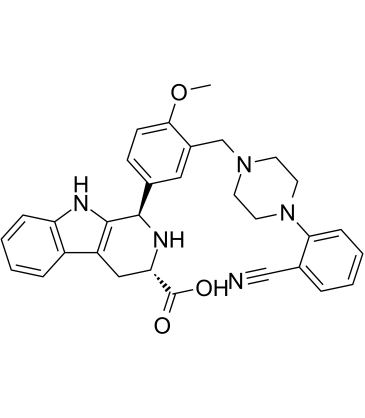2250019-90-8
| Name | Ned-K |
|---|
| Description | Ned-K is a nicotinic acid adenine dinucleotide phosphate (NAADP) antagonist. Ned-K is effective at dampening simulated ischaemia and reperfusion (sIR)-induced Ca2+ oscillations in cardiomyocytes[1]. |
|---|---|
| Related Catalog | |
| In Vitro | Ned-K suppresses Ca2+ oscillations and dramatically protects cardiomyocytes from cell death in vitro after ischaemia and reoxygenation, preventing opening of the mitochondrial permeability transition pore. Ned-K (10 µM) almost completely eliminates [Ca2+]c oscillations, and Ned-K (0.1 µM) is effective at suppressing [Ca2+]c levels[1]. Cell Viability Assay[1] Cell Line: Dead primary adult cardiomyocytes Concentration: 0.1 and 10 µM Incubation Time: Result: Treatment with 0.1 µM caused a slight decrease in cardiomyocyte death (34±6%). Treatment with 10 μM at reoxygenation significantly decreased cell death after sIR to 16±1%. |
| In Vivo | Injection of Ned-K causes a significant reduction in infarct size in mice. Ned-K (administered i.v. to mice 5 min before reperfusion) significantly decreases myocardial infarct size relative to area at risk[1]. |
| References |
| Molecular Formula | C31H31N5O3 |
|---|---|
| Molecular Weight | 521.61 |
